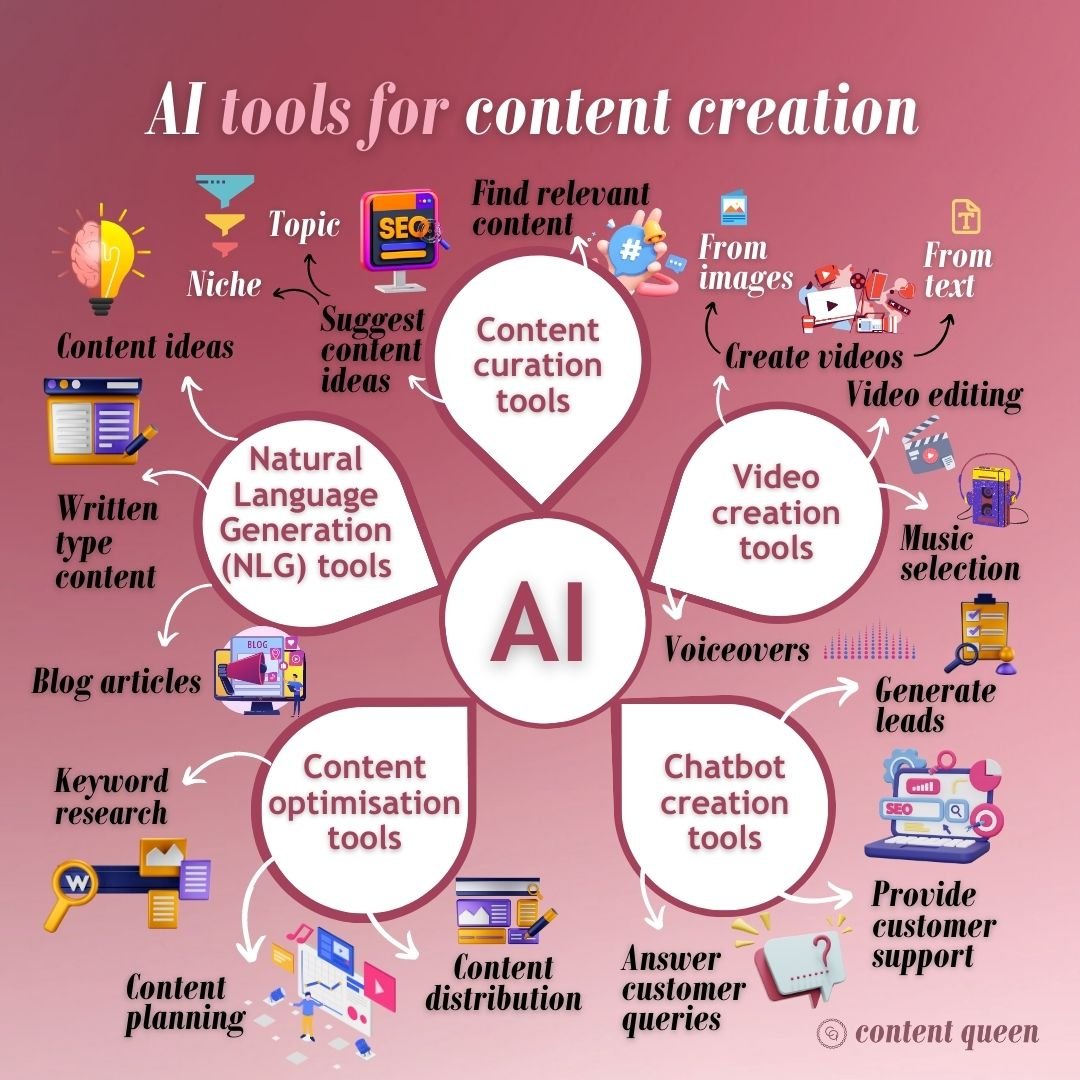AI and Content Creation: how they work together for business owners
Did you know that artificial intelligence (AI) is changing the game for content creation? With fancy technology like machine learning and natural language processing, AI can generate written content that's almost as good as what a human could do.
This is huge news for small business owners and entrepreneurs, as they can now whip up heaps of custom content in no time at all! We definitely need more time back in our lives.
What is AI and Content Creation?
AI (artificial intelligence), refers to the use of computer algorithms and machine learning techniques to simulate intelligent behaviour in machines. This can include a wide range of applications, from image and speech recognition to natural language processing and decision-making.
AI has been increasingly used in content creation to help automate certain tasks and make the process more efficient.
For example, AI-powered tools can help generate headlines, titles, and meta descriptions for articles, write product descriptions for e-commerce websites, or even create entire articles from scratch. AI can also be used to analyse data and generate insights that can inform content creation strategies.
However, while AI can be useful for certain tasks, it is important to note that it is not a substitute for human creativity and expertise. Content that is solely generated by AI may lack the nuance, tone, and creativity that only a human can provide. As such, it is important to strike a balance between the use of AI and human input in content creation to ensure the best results.
AI has the potential to transform the way that content is created, distributed, and consumed, and is likely to play an increasingly important role in the content creation industry in the years to come.
Here are the different types of AI and how they work for content creation:
Should we fear AI?
Short answer, no. Here is my own personal experience that might relate to whether we should fear AI as content marketers or service-based business owners.
My first job was at Kmart. I started as a checkout chick and then moved up to being a door greeter, a team leader, and a self-serve operator. I even did some recovery work, which is basically making sure everything on the shelves looks good. I also watered plants in the garden centre. I worked there for six years.
At first, everything was pretty manual. We had to count the money and use those touchscreens. But eventually, we got self-serve checkouts. Some people thought it would take our jobs away, but it actually gave me the chance to learn a new skill.
Now, as a marketer, I see AI in the same way. It's not something to be afraid of, but an opportunity to learn and grow. I mean, machines don't always work perfectly, right? Just think about those annoying "unexpected item in the bagging area" messages at the supermarket, not a vibe.
So I asked AI if it would replace content marketers, and the answer I got was pretty spot on. AI is already being used in content marketing to automate things like content creation, optimization, and distribution. But it still needs humans to make sure the content is high quality and aligned with the brand's values.
At the end of the day, content marketing involves more than just producing content. It's about understanding your target audience, creating a brand voice, and building relationships with customers. And those are all things that require human expertise and creativity.
AI is a valuable tool for content marketers, but it's unlikely to replace us entirely. It's all about finding the right balance between human input and AI automation.
What AI tools help with content creation?
There are a number of AI tools that can help with various aspects of content creation. Here are a few examples:
Grammarly: Grammarly is a popular AI-powered writing assistant that can help writers improve their grammar, spelling, and style. It uses natural language processing algorithms to analyse text and suggest corrections and improvements.
Canva: Canva is a graphic design platform that uses AI algorithms to help users create professional-looking designs quickly and easily. It offers a wide range of templates and design elements that can be customised to meet the needs of the user.
Adobe Sensei: Adobe Sensei is an AI and machine learning platform that is integrated into many of Adobe's creative tools, including Photoshop, Illustrator, and Premiere Pro. It can help with tasks such as image recognition, object removal, and automatic video editing.
Metricool: Metricool Insights is a social media analytics tool that uses AI algorithms to analyse social media data and provide insights into audience behaviour, sentiment analysis, and more. This can be useful for developing content strategies and tracking the performance of social media campaigns.
These are just a few examples of the many AI tools available to help with content creation. As AI continues to develop and evolve, we can expect to see more and more tools emerge that are specifically designed to assist with various aspects of the content creation process.
What about ChatGPT?
The content creation world has been amazed by this new tool.
As a language model, ChatGPT can assist with content creation in several ways. Here are a few examples:
Idea generation: ChatGPT can generate ideas for content based on a specific topic or theme. Users can provide a prompt or ask a question, and ChatGPT can provide relevant information and insights that can be used to develop new content ideas.
Writing assistance: ChatGPT can assist with the writing process by suggesting alternative phrases, correcting spelling and grammar errors, and providing feedback on style and tone. This can be particularly useful for non-native speakers or for those who are new to a particular subject area.
Content optimisation: ChatGPT can help optimise content for search engines by suggesting relevant keywords, providing insights into user intent, and analysing the readability of the text.
Personalisation: ChatGPT can personalise content for individual users by analysing their behaviour and preferences, and tailoring content to their specific needs and interests.
ChatGPT can be a useful tool for content creators who are looking to improve their writing, generate new ideas, and engage with their audience more effectively. However, it's important to note that while ChatGPT can provide valuable assistance, it's not a replacement for human creativity and expertise.
What type of question would you ask AI (like ChatGPT) for content?
Here are some easy-peasy questions you can ask AI to create content:
Can you give me [ADD NUMBER] title options for this blog?
As a [ADD SERVICE] what type of blogs/podcasts/social media posts should I create?
Can you write an article on this topic for me?
Can you come up with a description for this product based on its features?
Can you help me create some cool social media posts for my campaign?
Can you write an email for me based on this text?
Can you plan 12 months of social media topics for me?
Can you give me the data on xx campaigns?
The list goes on… you just want to be as specific as possible.
AI can also help personalise content based on what it knows about people, like where they live or what they've searched for online. This can be very useful if you want to create content that feels like it's just for them.
Of course, while AI is a super helpful tool for creating content, it's not going to replace real-life humans anytime soon.
AI-generated content should always be double-checked by a real person to make sure it's accurate and easy to read. But also, it needs the stories, the personal touches that only you or your team can add to the content.
Final thoughts
AI is making waves in the world of content creation, and we're only going to see more of it in the future. By using AI tools to generate high-quality content based on data-driven insights, businesses, and organisations can create more effective and engaging content that really speaks to their audience.
If you want to learn more about how it can help your business as a whole, a Content Queen client has an amazing resource to help you with this too.


